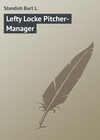Buch lesen: «Frank Merriwell's New Comedian: or, The Rise of a Star», Seite 11
CHAPTER XX. – MAN OR WOMAN
Into the cab sprang the woman. Slam! the door closed behind her. Crack! – the whip of the driver fell on the horses, and away went the cab.
“Stop!” shouted Hodge.
Cabby did not heed the command.
Frank made a rush for another cab.
“Follow!” he cried, pointing toward the disappearing vehicle. “I will give you five dollars – ten dollars – if you do not lose sight of that cab!”
“In!” shouted the driver. “I’ll earn that ten!”
In Frank plunged, jerking the door to behind him. The cab whirled from the platform with a jerk. Away it flew.
“It will be worth twenty dollars to get a peep beneath that veil!” muttered Frank Merriwell.
The windows were open. He looked out on one side. He could see nothing of the cab they were pursuing. Back he dodged, and out he popped his head on the other side.
“There it is!”
He felt that he was not mistaken. The fugitive cab was turning a corner at that moment. They were after it closely.
Frank wondered where the woman could have been hidden on the train so that she had escaped observation. He decided that she must have been in one of the toilet rooms.
But what about the veiled man who was disguised as a woman? That man had known Frank – had spoken his name.
It was a double mystery.
The pursuit of the cab continued some distance. At last the cab in advance drew up in front of a hotel, and a man got out!
Merriwell had leaped to the ground, and cabby was down quite as swiftly, saying:
“There, sir, I followed ’em. Ten plunks, please.”
The door of the other cab had been closed, and the man was paying the driver. He wore no overcoat, and carried no baggage.
“Fooled!” exclaimed Frank, in disappointment. “You have followed the wrong cab, driver!”
“I followed the one you told me to follow,” declared the driver.
“No; you made a mistake.”
“Now, don’t try that game on me!” growled the man. “It’s your way of attempting to get out of paying the tenner you promised.”
“No; I shall pay you, for you did the best you could. It was not your fault that you made a mistake in the mass of carriages at the depot.”
“Didn’t make no mistake,” asserted the cabby, sullenly.
“Well, it’s useless to argue over it,” said Merry, as he gave the man the promised ten dollars. “I am sure you made a mistake.“
“Think I couldn’t follow Bill Dover and his spotted nigh hawse?” exploded the driver. “I couldn’t have missed that hawse if I’d tried.”
Frank saw one of the horses attached to the other cab was spotted. He had noticed that peculiarity about one of the horses attached to the cab the mysterious woman had entered.
“It’s the same horse!” exclaimed Merry.
“’Course it is,” nodded the driver.
The man had paid his fare and was carelessly sauntering into the hotel. As he disappeared through the door-way, Frank sprang to the door of the other cab, flung it wide open, and looked in, more than half expecting to discover the woman still inside.
No woman was there!
Frank caught his breath in astonishment, and stood there, staring into the empty cab.
“Hi, there! wot cher doin’?” called the man on the box.
Frank did not answer. He reached into the cab and felt on the floor. He found something, brought it forth, looked at it amazed.
It was a woman’s dress!
But where was the woman?
Garment after garment Frank lifted, discovering that all a woman’s outer wearing apparel lay on the floor of that cab.
“Vanished!” he muttered. “Disappeared – gone? What does it mean?”
Then he thought of the man who had left the cab and entered the hotel, and he almost reeled.
“That was the woman!”
He had seen one woman change into a man on the train, and here was another and no less startling metamorphosis.
“Driver,” he cried, “didn’t you take a person on in woman’s clothes at the station and let one off in man’s clothes just now?”
“None of yer business!” came the coarse reply. “I knows enough not ter answer questions when I’m paid ter keep still.”
That was quite enough; the driver might as well have answered, for he had satisfied Merriwell.
Frank was astonished by the remarkable change that the woman had made while within the cab, but now he believed he understood why she had not been detected while on the train. She had been able to make a change of disguises in the toilet room, and had passed herself off as a man. Hodge had looked for a veiled woman, and he had looked for a veiled woman; it was not strange that both of them had failed to notice a person in masculine attire who must have looked like a woman.
Up the hotel steps Frank leaped. He entered the office, he searched and inquired. At last, he found out that a beardless man had entered by the front door, but had simply passed through and left by a side door.
“Given me the slip,” decided Frank. He realized that he had encountered a remarkably clever woman.
And the mystery was deeper than ever.
Frank went to the hotel at which the company was to stop, and found all save Wynne had arrived. Hodge was on the watch for Merry, and eagerly inquired concerning his success in following the woman. Frank explained how he had been tricked.
“Well, it’s plain this unknown female is mighty slippery,” said Bart. “You have not seen the last of her.”
“I am afraid there are some things about this double mystery which will never be solved,” admitted Frank. “For instance, the identity of the man who fell into the river.”
“We’ll be dead lucky if we do not have trouble over that affair,” said Hodge.
“How do you mean?”
“Some fool is liable to swear out a warrant charging us with throwing the unknown overboard.”
“I thought of that,” nodded Frank, “and that is why I took occasion on the train to straighten out your story somewhat. It is always best, Bart, to stick to the straight truth.”
Hodge flushed and looked resentful, but plainly sought to repress his feelings, as he said:
“I am not the only person in the world who believes the truth should not be spoken at all times.”
“If one cannot speak the truth,” said Merry, quietly, “he had better remain silent and say nothing at all, particularly in a case like this. There is an old saying that ‘the truth can afford to travel slowly, but a lie must be on the jump all the time, or it will get caught.’”
“Well, I don’t think this is any time to moralize,” came a bit sharply from Bart. “If we were to go into an argument, I rather think I could show logically that a white lie is sometimes more commendable than the truth.”
“In shielding another, possibly,” admitted Merry; “but never in shielding the one who tells it. The more a person lies, the more he has to lie, for it becomes necessary to tell one falsehood to cover up another, and, after a while, the unfortunate individual finds himself so ensnared in a network of fabrications that it is impossible for him to clear himself. Then disaster comes.”
“Oh, don’t preach!” snapped Bart. “Let’s go to your room and talk this matter of the veiled woman over. There is trouble brewing for you, and you must be prepared to meet it. Havener has registered for the company, and all you have to do is call for your key.”
So Frank and Bart went to the room of the former.
Puelbo had been well “papered.” The work was done thoroughly, and every board, every dead wall, and every available window flaunted the paper of “True Blue.”
The failure of “For Old Eli” was still fresh in the minds of the people of the city, but neither had they forgotten Frank Merriwell’s plucky promise to bring the play back to that place and perform it successfully there.
The newspapers of the place had given him their support, but Frank was determined that extracts from the notices in the Denver papers should reach the eyes of those who did not read the Puelbo papers closely. With this end in view, he had the extracts printed on flyers, as small bills are called, and the flyers were headed in startling type:
To this he added:
“Five Hundred Dollars Fine!”
To this he added:
“Each and every person who reads the following clippings from Denver newspapers will be fined Five Hundred Dollars!”
“Each and every person who reads the following clippings from Denver newspapers will be fined Five Hundred Dollars!”
It is needless to say that nearly every one who could read was careful to read the clippings through to the end.
This manner of attracting attention was effective, even though it may seem rather boyish in its conception.
His printing was done on the very night that he arrived in Puelbo, and the flyers were scattered broadcast the following day.
He obtained the names of a large number of prominent citizens, to whom he sent complimentary tickets, good for the first night’s performance.
Frank was determined to have a house, even if it was made up principally of deadheads.
On the occasion of his former visit to Puelbo he had received some free advertising through Leslie Lawrence, who had circulated printed accusations against him. He scarcely expected anything of the sort on this occasion, and he was rather startled when, on the morning following his arrival, he discovered that a circular had been scattered broadcast, which seemed to be even more malicious than the former attempt upon him.
In this circular he was plainly charged with the murder of an unknown woman shortly after leaving Denver, and it was said he had been aided in the crime by Bartley Hodge.
Frank was calmly reading this bold accusation when Hodge came bursting into the room in a manner that reminded Merry of his entrance under similar circumstances on the former occasion.
Seeing the paper in Merry’s hand, Bart hoarsely cried:
“So you’ve got it! Then you know about it! Well, now, sir, what do you think of that?”
“Sit down, Hodge,” said Frank, calmly. “You seem all out of breath. You are excited.”
“Excited!” shouted the dark-faced youth. “Well, isn’t that enough to excite a man of stone!”
“Do you mean this?”
“Yes, that! What in the name of creation do you suppose I meant?”
“I wasn’t certain.”
“Wasn’t cert – Oh, say; that’s too much! What do you think? What are you made of, anyway?”
“Now, my dear fellow, you must stop going on like this. You’ll bring on heart disease if you keep it up.”
Hodge dropped down on a chair and stared at Merry.
“Well – I’ll – be – blowed!” he gasped.
“You are nearly blowed now,” said Frank. “You seem quite out of breath.”
“Is it possible you have read that paper you hold in your hand?” asked Bart, with forced calmness.
“Yes, I have read it.”
“Well, I do not understand you yet! I thought I did, but I’m willing to confess that I don’t.”
Then he jumped up, almost shouting:
“Why, man alive, don’t you understand that we are charged with murder – with murder?”
“Yes,” said Frank, still unruffled, “it seems so by this.”
“And you take it like that!”
“What is the use to take it differently?”
“Use? Use? Sometimes I think you haven’t a drop of good, hot blood in your body.”
“If a person has plenty of good, hot blood, it is a good thing for him to cool it off with good, cool brains. Hot blood is all right, but it should be controlled; it should not control the man.”
“I don’t see how you can talk that way, under such circumstances. Why, we may be arrested for murder any moment!”
“We shall not.”
“Shall not?”
“No.”
“Why not?”
“Because our unknown enemy does not dare come out into the open and make the charge against us.”
“What makes you think so?”
“This.”
Frank held up the accusing paper.
“That?”
“Yes.”
“Why should that make you think so?”
“If our enemy had intended to come out and make the charge against us openly, this would not have appeared. It is simply an attempt to hurt us from under cover, or to arouse others against us – against me, in particular.”
Bart could see there was logic in Merry’s reasoning, but still he was fearful of what might happen.
“Well, even you must acknowledge that the unknown enemy may succeed in his purpose,” said Hodge. “There were a number of persons who saw something of the struggle on the train. This may arouse some of them, or one of them, at least, to do something.”
“It may.”
“You confess that?”
“Yes.”
“Didn’t think you would.”
“I don’t believe it will. Hodge, I have a fancy that, in this case, same as in the other, my enemy will overshoot the mark.”
“How?”
“Something tells me that this warning, intended to turn suspicion against me, will serve as an advertisement. Of course, it will be a most unpleasant notoriety to have, but it may serve to bring people out to see me.”
Bart looked thoughtful.
“I never thought of that,” he confessed, hesitatingly.
“I had far rather not had the notoriety,” admitted Frank; “but that can’t be helped now. Let the people turn out to see ‘True Blue.’ Perhaps I’ll get a chance at my enemy later.”
“The veiled woman – ”
“Is in it, I fancy. I believe there was some connection between the veiled woman and the veiled man – the one who plunged from the train into the river.”
“I have thought of that, but I’ve been unable to figure out what the connection could be. Why was the man veiled and disguised thus?”
“So that I would not recognize him.”
“Then, it must be that you would know him if you saw him face to face.”
“As he knew me. He called me by name as he sprang upon me.”
“Well, he’s done for, but I believe the woman will prove the most dangerous. Something tells me she was the real mover in this business.”
“I fancy you are right, Hodge. At first, in Denver, I thought she had been piqued by the manner in which I replied to her, but since all these strange things have happened, I know it was more than a case of pique.”
“When you make a woman your enemy, she is far more dangerous than a man, for women are more reckless – less fearful of consequences.”
“That’s right,” nodded Frank. “Women know they will not be punished to the full extent of the law, no matter what they do. Juries are easily hypnotized by pretty women. Where a woman and a man are connected in committing a crime, and the woman is shown to be the prime mover, a jury will let the woman off as easily as possible. A jury always hesitates about condemning a woman to death, no matter if she has committed a most fiendish murder. In the East, women adventuresses ply their nefarious arts and work upon the sympathies of the juries so that, when called to the bar, they are almost always acquitted. It is remarkable that men should be so soft. It is not gallantry; it is softness. The very man who would cry the loudest if he had been hit by an adventuress is the most eager to acquit the woman in case he happens to be on the jury to pronounce the verdict in her case.”
“Well,” said Hodge, “you are sound and level in that statement, Frank. It’s plain you do not think true chivalry consists of acquitting female blackmailers and assassins.”
“Don’t let this little attempt to injure us frighten you, Hodge,” advised Frank, rising. “I think it will miscarry entirely. We’ve got plenty of work for to-day, and to-night I believe I shall be able to tell beyond a doubt whether ‘True Blue’ is a success or a failure. I think the test will come right here in Puelbo, where we met disaster before.”
CHAPTER XXI. – GALLUP MEETS THE MYSTERIOUS WOMAN
The mechanical arrangements and special scenery had arrived and were moved into the theater. Supers had been engaged to attend rehearsal in the afternoon, so that they might know their business when evening came.
Frank attended to the details of much of the work of making ready, although he had full confidence in Havener and Hodge, who assisted him. He saw that the mechanical effect representing the boat race was put up and tested, making sure it worked perfectly. He was anxious about this, for any hitch in that scene was certain to ruin the whole play.
Gallup proved valuable. He worked about the stage, and he was of great assistance to Havener, who wished Merriwell to appoint him assistant stage manager.
Of course, everybody was anxious about the result, but the majority of the company had confidence in Merriwell and his play. Cassie Lee, perhaps, was the only one who was never assailed by a doubt concerning the outcome.
“I shall do my best to-night – at any cost,” she told Frank.
At that moment he did not pause to consider the real meaning of her words. Afterward he knew what she meant. She still carried a tiny needle syringe and a phial that contained a certain dangerous drug that had so nearly wrought her ruin.
The various members of the company drifted into the theater by the stage entrance, looked over their dressing rooms and the stage and drifted out again. They had been engaged to act, and they did not propose to work when it was not necessary.
Gallup whistled as he hustled about the work Havener directed him to do. He made his long legs carry him about swiftly, although he sometimes tripped over his own feet.
Ephraim was arranging a mass of scenery so that every piece would be handy for use that night when the time came to use it. While doing this, he was surprised to see one of the dressing-room doors cautiously open and a person peer out.
“Gosh!” exclaimed the Vermonter, stepping back out of sight. “Who’s that?”
Again the person peered out of the dressing room, as if to make sure the coast was clear.
“I must be dreamin’!” thought the Vermont youth, rubbing his eyes. “I’ve got ’em jest from hearin’ Frank and Hodge talk so much about her.”
A moment later he changed his mind.
“No, by ginger!” he hissed, as the person slipped out of the dressing room. “It’s her!”
It was “her,” and that means that it was the mysterious veiled woman!
Recovering instantly from the shock of his surprise, Gallup sprang out from behind the scenery and made a rush for the unknown.
“Hold on!” he cried. “B’gosh! yeou’ve gotter give a ’count of yerself, an’ don’t yeou fergit it!”
She started, turned on him, dodged. He flung out his hand and clutched at her, catching hold of the chain that encircled her neck and suspended her purse.
“I want yeou!” palpitated the Yankee youth. “Yeou’re jest the – ”
Flirt! – the woman made a quick motion toward him. Something struck Ephraim in his eyes, burning like fire. He was nearly knocked down by the shock, and a yell of pain escaped his lips.
“I’m blinded!” he groaned.
It was true; he could not see.
With something like a scornful laugh, the woman flitted away and disappeared, leaving poor Ephraim bellowing with pain and clawing at his eyes, as if he would dig them out of his head.
“Murder!” he howled. “Oh, I’m dyin’! Somebody come quick! My eyes hev been put aout! Oh, wow-wow! Oh, I wisht I’d staid to hum on the farm!”
Down on the floor he fell, and over and over he rolled in the greatest agony.
Havener and some of the regular theater hands heard his wild cries and came rushing to the spot. They found him on the floor, kicking and thrashing about.
“What’s the matter?” demanded the stage manager.
Gallup did not hear him.
“I’m dyin’!” he blubbered. “Oh, it’s an awful way ter die! My eyes are gone! Ow-yow!”
“What is the matter?” Havener again cried, getting hold of the thrashing youth. “What has happened?”
“Stop her!” roared Ephraim, realizing that some person had come and thinking instantly that the woman must be detained. “Don’t let her git erway!”
“Don’t let who get away?”
“The woman! Ow-wow! Bring a pail of warter an’ let me git my head inter it! I must do somethin’ ter put aout the fire! Oh, my eyes! my eyes!”
“What is the matter with your eyes?”
“She threw somethin’ inter ’em.”
“She?”
“Yes.”
“Who?”
“The woman.”
“What woman?”
“The veiled woman – the one that has made all the trouble fer Merry! Oh, this is jest awful!”
“What are you talking about?” demanded Havener, impatiently. “There is no veiled woman here! Have you lost your senses?”
Then, realizing that they were doing nothing to prevent her from making her escape, Gallup sat up and howled:
“She was here! I saw her comin’ aout of a dressin’ room. Oh, dear! Yow! I tried to ketch her! Oh, my eyes! She flung somethin’ inter my face an’ put both my eyes out!”
“Something has been thrown into his eyes!” exclaimed Havener. “It’s red pepper! He is telling the truth! Somebody get some water! Somebody run to a drug store and get something for him to use on his eyes!”
“Darn it all!” shouted Gallup. “Let me die, ef I’ve gotter! but don’t let that infarnal woman git erway!”
“I will try to see to that,” said Havener, rushing away.
He dashed down to the stage door, but he was too late, for the doorkeeper told him the veiled woman had gone out.
“Why in the world did you let her in?” angrily demanded the irate stage manager.
“She said she belonged to the company.”
“She lied! She has half killed one of the company!”
“I heard the shouts,” said the doorkeeper, “and I thought somebody was hurt. But it wasn’t my fault.”
“If she tries to come in here again, seize and hold her. I’ll give you five dollars if you hold her till I can reach her! She is a female tiger!”
Then Havener rushed back to see what could be done for Gallup.
Groaning and crying, Gallup was washing the pepper from his eyes, which were fearfully inflamed and swollen. He could not see Havener, but heard his voice, and eagerly asked:
“Did ye ketch the dratted critter?”
“No; she got out before I reached the door.”
“Darn her!” grated Ephraim. “I say darn her! Never said ennything as bad as that about a female woman before, but I jest can’t help it this time! I won’t be able to see fer a week!”
“Oh, yes, you will,” assured Havener. “But I rather think your eyes will look bad for some time to come.”
“Here is something he had in his hand,” said one of the supers. “It’s her purse, I reckon; but there ain’t no money in it.”
Havener took it.
“Are you sure there wasn’t any money in it when you examined it?” he asked, sharply.
The super seemed to feel insulted, and he angrily protested that he would not have touched a cent if there had been five hundred dollars in it.
“But I notice you had curiosity enough to examine the contents of it,” came dryly from the stage manager. “I’ll just keep this. It may prove to be a valuable clew to the woman’s identity.”
Everything possible was done for Ephraim’s eyes, but it was a long time before he was much relieved from the agony he was suffering. Then he was taken to the hotel, with a bandage over his eyes, and a doctor came to attend him.
The physician said he would do everything possible to get Ephraim into shape to play that evening, but he did not give a positive assurance that he would be able to do so. As soon as Frank heard of the misfortune which had befallen the Vermont youth, he hastened to the hotel and to the room where Ephraim was lying on the bed.
Gallup heard his step and recognized it when he entered.
“I’m slappin’ glad yeou’ve come, Frank!” he exclaimed.
“And I am terribly sorry you have met with such a misfortune, Ephraim,” declared Merry.
“So be I, Frank – so be I! But I’m goin’ ter play my part ter-night ur bu’st my galluses tryin’! I ain’t goin’ to knock aout the show ef I kin help it.”
“That was not what I meant. I was sorry because of the pain you must have suffered.”
“Waal, it was ruther tough,” the faithful country lad confessed. “By gum! it was jest as ef somebody’d chucked a hull lot of coals right inter my lookers. It jest knocked me silly, same ez if I’d bin hit with a club.”
“How did it happen? Tell me all about it.”
Ephraim told the story of his adventure, finishing with:
“I kainder guess that red pepper warn’t meant fer me, Frank. That was meant fer yeou. That woman was in there ter fix yeou so yeou couldn’t play ter-night.”
“It’s quite likely you may be right, Ephraim; but she had to give it to you in order to escape. But where is this purse you snatched from her?”
“On the stand, there. Havener tuck possession of it, but I got him to leave it here, so yeou might see it right away when yeou came.”
Frank found the purse and opened it. From it he drew forth a crumpled and torn telegram. Smoothing this out, he saw it was dated at Castle Rock the previous day. It read as follows:
“Mrs. Hayward Grace, Puelbo, Colo.
“All right. Close call. Fell from train into river. Came near drowning, but managed to swim out. Will be along on first train to-morrow. Keep track of the game.
“P. F.”
Frank jumped when he read that.
“By Jove!” he cried.
“Whut is it?” Ephraim eagerly asked.
“I believe I understand this.”
“Do ye?”
“Sure! This was from the man who fell from the train into the river – the man disguised as a woman, who attacked me on the rear platform!”
“Looks zif yeou might be right.”
“I am sure of it! The fellow escaped with his life! It is marvelous!”
“I sh’u’d say so!”
“He dispatched his accomplice, the woman, to let her know that he was living.”
“Yeou’ve struck it, Frank!”
“And she was the one who got out the accusing flyers, charging me with the crime of murder!”
“I bet!”
“The man is in this city now, and they are working together again.”
“I dunno’d I see whut they’re goin’ to make aout of it, but mebbe yeou do.”
“Not yet. They must be enemies I have made.”
“Who’s Mrs. Hayward Grace?”
“Never heard the name before.”
“Waal, he didn’t sign his name Hayward Grace, so it seems he ain’t her husband; don’t it, Frank?”
“He signed ‘P. F.’ Now, I wonder what one of my enemies can be fitted to those initials?”
“I dunno.”
“Nor do I. But this telegram has given me a feeling of relief, for I am glad to know the man was not drowned.”
“Drownin’s too good fer him! He oughter be hung!”
“Although my conscience was clear in the matter, I am glad to know that I was in no way connected with his death. Hodge will not be so pleased, for he will not stop to reason that the chances of a charge of murder being brought against us are about blotted out. Ephraim, I am very sorry you were hurt, but I’m extremely glad you snatched this purse and brought me this telegram. I shall take care of it. I shall use it to trace my enemies, if possible.”
“Waal, I’m glad I done somethin’, though I’d bin a ’tarnal sight gladder if I hed ketched that woman.”
Frank carefully placed the purse and the telegram in his pocket, where he knew it would be safe.
Assuring Ephraim that everything possible should be done for him, he hastened out.
That afternoon the rehearsal took place, with another person reading Ephraim’s part. It was feared that Gallup would not be able to see to play when it came night, but Frank hoped that he could, and the Vermont youth vowed he’d do it some way.
The rehearsal passed off fairly well, although there were some hitches. Havener looked satisfied.
“I’d rather it would go off this way than to have it go perfectly smooth,” he declared. “I’ve noticed it almost always happens that a good, smooth rehearsal just before a first performance means that the performance will go bad, and vice versa.”
Frank had not been long in the business, but he, also, had observed that it often happened as Havener had said.
The theater orchestra rehearsed with them, getting all the “cue music” arranged, and having everything in readiness for the specialties.
The night came at last, and the company gathered at the theater, wondering what the outcome would be.
Gallup was on hand, but he still had the bandage over his eyes. He was wearing it up to the last minute, so that he would give them as much rest as possible.
“Somebody’ll hev ter make me up ter-night,” he said. “I don’t believe I kin see well enough ter do that.”
Havener agreed to look after that.
While the various members were putting the finishing touches on their toilet and make-up, word came that people were pouring into the theater in a most satisfactory manner. The orchestra tuned up for the overture.
Frank went round to see that everybody was prepared. He had fallen into that habit, not feeling like depending on some one else to do it.
Most of the men were entirely ready. A few were making the last touches. Stella Stanley and Agnes Kirk were all ready to go on.
“Where is Cassie?” asked Merry.
“In the dressing room,” said Stella. “She told us not to wait for her. Said she would be right out.”
Frank went to the dressing room. The door was slightly open, and, through the opening, he saw Cassie. She had thrust back the sleeve of her left arm, and he saw a tiny instrument in her right hand. He knew in a twinkling what she was about to do.
With a leap, Frank went into that room and caught her by the wrist.
“Cassie!” he cried, guardedly. “You told me you had given it up! You told me you’d never use morphine again!”
“Frank!” she whispered, looking abashed. “I know I told you so! I meant it, but I must use it just once more – just to-night. I am not feeling at my best. I’m dull and heavy. You know how much depends on me. If I don’t do well I shall ruin everything. It won’t hurt me to use it just this once. The success of ‘True Blue’ may depend on it!”
“If the success of ‘True Blue’ depended on it beyond the shadow of a doubt, I would not let you use it, Cassie! Great heavens! girl, you are mad! If you fall again into the clutches of that fiend nothing can save you!”
“But the play – ”
“Do you think I would win success with my play at the price of your soul! No, Cassie Lee! If I knew it meant failure I would forbid you to use the stuff in that syringe. Here, give it to me!”
He took it from her and put it into his pocket.
“Now,” he said, “it is out of your reach. You must play without it. There goes the overture. The curtain will go up in a few minutes. All I ask of you is to do your best, Cassie, let it mean success or failure.”



















